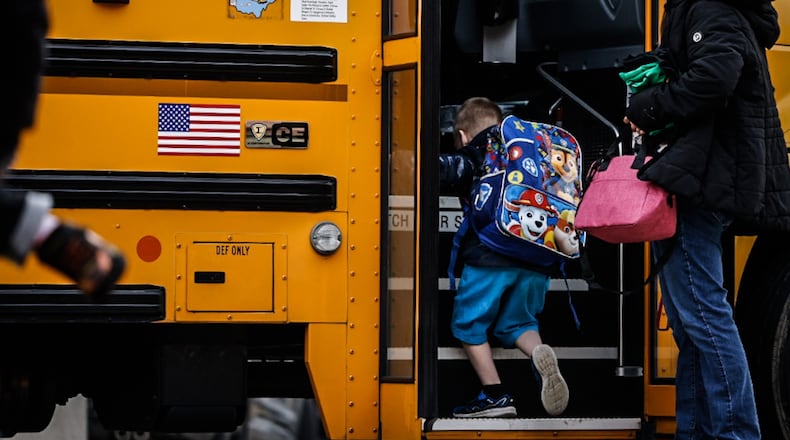According to its five-year forecast, the district had $59.2 million in the bank last summer. That equaled about 75% of one year’s expenses, which is about double the statewide average, according to a recent Dayton Daily News study.
Huber Heights officials say the school district began deficit spending — or spending more per year than it’s bringing in — last year.
“We are not in good financial shape when you consider the huge hole in this boat: deficit spending,” Treasurer Penny Rucker said Thursday.
Huber Heights schools were more than $3 million in the black in each of the 2019-20 and 2020-21 school years, then $3.5 million in the red in 2021-22, according to their five-year forecast.
Huber Heights has not passed a school levy that increased taxes for daily expenses since 2005. Of the 20 largest school districts in the Dayton area, only Xenia has gone longer, according to Dayton Daily News research.
Rucker said the district’s forecast projects deficit spending will continue over the next five years ($4.4 million projected this year), making it difficult to continue services at the current level.
“Even with the bottom-line balance this year, we would still need a sizable levy to cover this level of deficit spending,” she said. “We are not in good financial shape in the long run and we have to make plans now to address these large problems.”
Huber Heights’ projections suggest the district’s revenue will drop 2% from 2022-27 (it is the only large local suburban district to project a revenue drop in that span), while estimating its expenses will increase 18%.
Regardless of the the levy request outcome, the district plans to implement budget cuts next school year.
The school board voted in February to approve a $1.7 million budget cut, which will go into effect during the 2023-24 school year, and will include some cuts to administration, classified personnel, and anticipated hiring, as well as the reallocation of federal grants, and reduction of funding for things like after-school tutoring and staff training.
“We are starting now because the earlier you cut, the smaller you can cut and make greater strides in impacting your bottom-line for longer,” she said. “The same is true in raising revenues; the earlier you go to the electorate, the lower the millage rate will be.”
According to the Ohio Department of Education, about 75% of Ohio school districts spent more money per student than Huber Heights in 2021-22.
While the district has held multiple public meetings encouraging input from residents, some voters feel they don’t know enough details about the levy request and reasons for it.
Resident Bob Mercier said he had not heard about the levy.
“If the levy was really necessary, they should have been telling us what financial issues they were facing in advance of the levy,” Mercier said.
Resident Paul Schaeffer said he feels the district needs to focus on educational outcomes or parents will be tempted to transfer their students to private schools, a larger possibility if the legislature expands the school voucher program, as proposed.
State report card data from 2022 shows Huber Heights schools ranked behind about 90% of Ohio districts in performance index on state tests, and better, but still below average, in student progress.
“I believe HHCS must develop and implement a stakeholder-developed, adopted, and supported strategic plan that is both realistic and is built on proven highly successful strategies and initiatives for improving educational outcomes before I can vote for a levy to increase funding,” Schaeffer said.
Linda Hutchinson has custody of her 8-year-old great-granddaughter, who attends Charles Huber Elementary School. Though Hutchinson said she had heard of the ballot issue, she does not feel she’s been adequately informed of the details.
Still, Hutchinson is supportive of a levy initiative, as she said her granddaughter has had a good experience in the district. She also feels it’s important to support teachers, including paying them fair salaries.
“My great-granddaughter’s teachers go above and beyond and they work very hard,” she said.
When the board approved $1.7 million in budget cuts in February, they also voted to table a larger $2.4 million cut proposal, which would have only come into play if the levy is rejected in May.
Superintendent Jason Enix confirmed that regardless of the outcome in May, the $1.7 million budget reduction will be the only cut package implemented next school year.
But he noted the board will monitor the ongoing state budget negotiations, which will establish state school funding levels for fiscal years 2024-2025, to determine if additional action is needed.
About the Author

